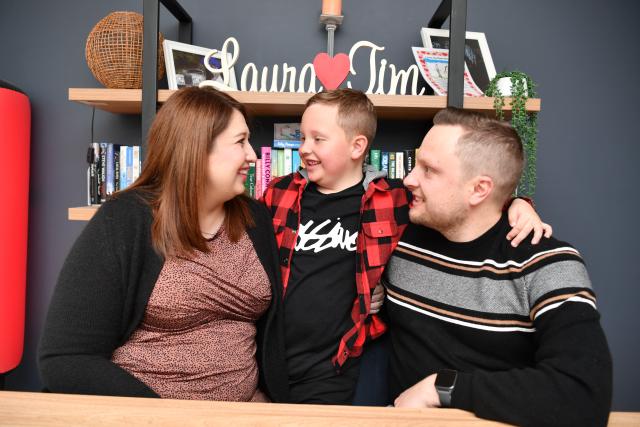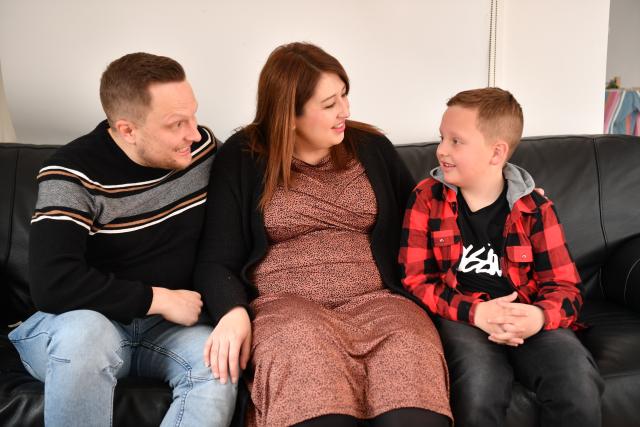By Laura Michell
Imagine having gastro-like symptoms for nine months, battling to keep down a glass of water and most foods.
Now imagine being pregnant at the same time, because that’s what it is like to suffer from hyperemesis gravidarum (HG).
Hyperemesis is a “potentially life-threatening condition that may cause weight loss, malnutrition, dehydration, and debility due to severe nausea and/or vomiting, and may cause long-term health issues for mother and baby(ies)”, according to The HER Foundation, a global charity advocating for better HG awareness and treatment.
It’s believed the condition affects between one and three percent of pregnancies and has a recurrence rate of about 80 percent.
I’ve been unfortunate enough to suffer from it in both my pregnancies.
In my first pregnancy, HG lasted until I gave birth to my son at 38 weeks, and it’s showing no signs of going away anytime soon in pregnancy number two.
So, what’s it like to actually suffer from HG?
In my experience, nausea and vomiting are the worst parts of the condition. I take a cocktail of drugs three times a day to keep the nausea, vomiting, and acid reflux under control.
Without them, I would never be able to leave my bathroom.
Before I found the right mix of medications in this pregnancy, I would be nauseous 24/7 and everything I ate was just about guaranteed to come back up.
Once I found the right medications, I still had to lock myself in my bedroom at the other end of our house while food was being cooked and eaten until I was well into my second trimester.
The smell of chicken or red meat cooking would have me reaching for a bucket.
Even now, in my eighth month, I’m still overcome by waves of nausea when certain foods are being cooked.
Then there are food aversions.
While other pregnant women carefully follow eating guidelines, giving up soft cheese and sushi for nine months, I struggle to find foods that I can actually keep down.
I can’t eat meat, most vegetables, or anything sweet. Trying to work out what to eat each day is exhausting!
In the early days of this pregnancy, I survived on buttered toast and two-minute noodles – hardly a nourishing diet – and some days even those ‘safe foods’ would fail me.
I also can’t keep a glass of water down, which ultimately makes hydration an ongoing battle.
This pregnancy, I’ve tried cordial, orange juice, apple juice, sparkling water, Powerade, and Coke – the saviour of many HG sufferers – in a desperate attempt to stay hydrated.
It’s a constant battle and I often need IV fluids to reverse my dehydration.
As you can imagine, all of these things combined make it difficult to go about your everyday life.
When you are constantly nauseous and on the verge of dehydration, everyday tasks like taking care of your family, cleaning your house, or working become too much to handle.
As a result, I have missed out on a lot this pregnancy. There has been less time to play with my son or take him on outings, less quality family time, and missed family functions, including a wedding and significant birthdays.
While missing out on all those moments hasn’t been ideal, these decisions have been necessary to keep me out of hospital and well enough to function on a basic level.
I’ve been able to work more this pregnancy than I did the first time around – largely thanks to my GP’s persistence in finding the right combination of medications – but that doesn’t mean that showing up to work each day has been any easier.
Working with HG, especially in weeks nine to 12 – referred to as ‘the death zone’ by sufferers because that is when symptoms are at their worst – can be almost impossible. It is very difficult to concentrate and give your job your all when all you want to do is throw up and sleep.
Showing up to work each day means I spend my evenings and weekends bed-ridden, recovering from the exhaustion of working and relying on my husband, Tim, to look after me and our son, Harrison.
Tim does all the cooking and the majority of the household chores and keeps Harrison entertained, all while trying to work himself.
My parents religiously visit us every Saturday to help clean, entertain Harrison, and cook batches of whatever meals I think I might be able to tolerate that week.
Without all of their support, I would not be able to turn up at work Monday to Friday.
For many HG sufferers, one of the most frustrating parts of the condition is the lack of awareness about hyperemesis.
For the most part, people don’t understand just how debilitating the condition can be unless they have suffered from HG or watched a loved one go through it.
As a result, HG can be a very isolating condition.
Most people expect you to be overcome with joy that you are expecting, but the intense sickness that HG brings often means joy is the last thing you are feeling.
It can be very hard for people to grasp the extent of the condition and well-meaning friends and family will often tell me to ‘just try and drink some water’ or ‘just try and eat some meat’ without really understanding why I can’t do these things.
It is also widely misunderstood by medical professionals.
I’ve encountered plenty of doctors, pharmacists, and midwives across my two pregnancies who have tried to treat HG like regular morning sickness, reluctant to offer the medication and intervention I need to survive.
There is also a community of HG sufferers past and present who lend their support to one another on Hyperemesis Gravidarum Support Australia Facebook page, helping you feel like you are not going through this alone, while charity Hyperemesis Australia has a wealth of resources to help get you through.
These resources are invaluable and cover everything from the SOMANZ (Society of Obstetric Medicine Australia and New Zealand) guidelines on treating nausea and vomiting in pregnancy and hyperemesis gravidarum, to useful tips on staying hydrated, when to seek intervention, and even how to prepare for future HG pregnancies.
As hard as an HG pregnancy can be, I know the months of suffering and sacrifice will all be worth it when the baby is born and my son meets his longed-for sibling.
Until then, I’ll just be taking it one day at a time.








